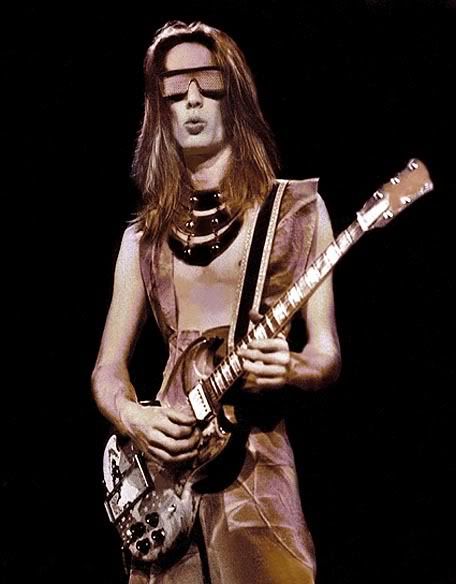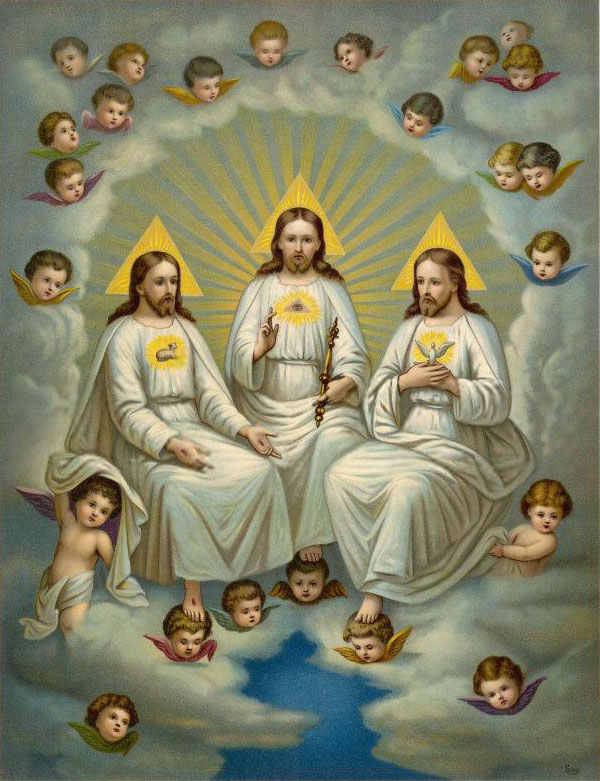
When I was a child
I thought as a child
I spoke as a child
I didnt know better
But now Im a man
I look like a man
I'm old as a man
And I should know better
"Real Man" Initiation (1975)
 With these words, Todd opens his most spiritual album (at that point) Initiation. This is also probably his most maligned album: it has been voted one of the worst 10 albums of all time; a rough call. It's not that bad, actually very good (certainly in my Rundgren Top 10) and is also the longest single LP made at 67 minutes.
With these words, Todd opens his most spiritual album (at that point) Initiation. This is also probably his most maligned album: it has been voted one of the worst 10 albums of all time; a rough call. It's not that bad, actually very good (certainly in my Rundgren Top 10) and is also the longest single LP made at 67 minutes.The album was made when Todd was experimenting with Theosophy, which makes the above opening lines even more intriguing, seeing how they are a paraphrase of:
When I was a child, I spake as a child, I felt as a child, I thought as a child: now that I am become a man, I have put away childish things. 1 Corinthians 13:11 RVIt is interesting that on his first overt spiritual record, he opens with a phrase that many of his listeners would know, like letting them know where he is heading, getting them into the right headspace before he takes a strong left turn. Even his phrase
There's a real manThis wouldn't have given his listeners any trouble, seeing how Paul carried on about how one needs to think about their spirit rather than their flesh.
Forget about my body and be a real man
"Real Man" Initiation (1975)
A few tracks in, and Todd puts his cards on the table:
I'm on my knees, one question pleaseWhich one? On Initiation he was certainly following Blavatsky, and particularly Alice Bailey: the 36 minute instrumental that takes up all of Side 2 is entitled "A Treatise on Cosmic Fire;" the name coming from Alice Bailey's 1928 book of the same name.
Will the real God please stand up?
Jesus and Moses, Mohammed, and Sri Krishna
Steiner, Gurdjief, Blavatsky, and Bhudda
Guru Maharaji, Reverend Sun Myung Moon
"Eastern Intrigue" Initiation (1975)
The title track is the most explicit for it's spiritual message:
See the shining soul break the ring-pass-notA read through this should help in understanding what Todd is going on about, but essentially the point is the separation of the spirit from it's human shackles, something not foreign to the New Testament:
Spiraling upward and it shall be revealed
The spirit is free
The universe wants it to be,
it calls you and me
Love has come, love has come
Over under,
it shall be revealed
"Initiation" Initiation (1975)
And I know such a manThe above words of Jesus to Nicodemus seem to me to be of a more conservative nature than Blavatsky's. Jesus isn't saying to forget about our bodies; more to recognise the importance of our spirit.
(whether in the body, or apart from the body, I know not; God knoweth),
how that he was caught up into Paradise
2 Corinthians 12:3-4 RV
I was in the Spirit on the Lord’s day,
and I heard behind me a great voice,
as of a trumpet
Revelation 1:10 RV
That which is born of the flesh is flesh;
and that which is born of the Spirit is spirit.
John 3:6 RV
On the next track, Todd explains his newfound spirituality to all. The opening line is very importnat to me. I remember feeling and saying a similar thing to my confused friends when I became a Christian:
I know that youve been wonderingThe end of the song has Todd repeating "goodbye". Again, I know this feeling. It isn't goodbye is the sense of finality, more the person you once knew has gone. I'm still the same, but I now have a different outlook, different priorities. Todd also references some of his earlier pop "hits". It is like he is saying goodbye to that part of himself.
If I'm the same man inside
Never tried to fool you
cause Ive got nothing to hide
I gave you fair warning I could never be tied down
'til Ive seen paradise with my very own eyes
Love owns us all,
time owns us all,
life owns us all
But the world doesnt own me
"Fair Warning" Initiation (1975)
The next album Another Live Utopia adds to all this, but not as personally. Where on Initiation we have Todd dealing with his new spirituality, here he explains some of the philosophy with us. More about the rays here.
Take one beam of lightIt is strange that when Todd expresses his spirituality interms of his personal experience, he is convincing and I really want to know more. When he explains some of the actual beliefs, he comes across as matter of fact, and not that interested in communicating them. Maybe the gig was off.....
Prism acquire
Break the white light down
Seven rays appear
One - red, the ruler seeking freedom
Two - gold, the father seeking unity
Three - orange, the thinker seeking understanding
Four - yellow, the poet seeking harmony
Take the seven rays
Pure as fire
Focus anywhere
White light will appear
Five - green, the scientist seeking truth
Six - blue, the disciple seeking goodness
Seven - indigo, the artist seeking beauty
"The Seven Rays" Another Live Utopia (1975)
Something must have happened to Todd after this. Mentions of a spirituality take a breather for a while, and what we do find is definately more Christian.
On 1976's Faithful on one of the lesser songs, Todd makes a very Christian paraphrase:
Now I lay me down to sleepUnfortunately, the song is humourous, especially Todd's awful fake Jamaican accent.
I'm praying Lord my soul to keep
If I die before I wake
Somebody make a big mistake
I dont expect for nothing
But Lord when I pray,
please be there
"When I Pray" Faithful (1976)
1977 saw two albums by Utopia. Interestingly the more obviously mystical Ra contains very little in the terms of spirituality. The next album Oops! Wrong Planet! however, does have some sense of spirit. (and is a far better album, to boot)
The opening track, while not spiritual, does tell us about soemone who is, and what the religious leaders think of such a happening:
Brother John saw visions of God
So they put him in chains
For acting too odd
As the crowd shouted, off with his head
The priest said, have mercy
Lets burn him instead
"Trapped" Oops, Wrong Planet! (1977)
If anything, it does tell us Todd's feeling on the Church. While he may be spiritual, he isn't neccesarily religious.
On the ballad of the album, "Love is the Answer" Todd make his most explicit Christian references (to my thinking, anyways):
Light of the world, shine on me
Love is the answer
Shine on us all, set us free
Love is the answer
We got to love one another
Just give it one more chance
Lord you just cant let it stop Lord
Love is the answer
Got to be free to let love into your life
Let it shine
"Love is the Answer" Oops, Wrong Planet! (1977)
Great stuff, and if you don't know this song, please check it out. To some it may be a bit AOR, but the sincerity is very hard to resist. Here Todd is referencing the Gospel of John
Jesus spake unto them, saying,Of course it is possible that Todd was not deliberately using these terms as Christian terms; in fact they are common phrases, but "light of the world" in Western society is normally used in reference to Christ. Considering the journey Todd was on, I think he knew what he was saying.
I am the light of the world:
he that followeth me shall not walk in the darkness,
but shall have the light of life.
John 8:12 RV
A new commandment I give unto you,
that ye love one another;
even as I have loved you,
that ye also love one another.
John 13:34 RV







